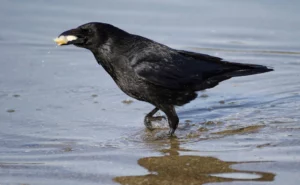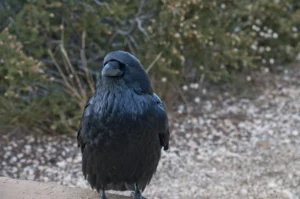Hibernation is a winter activity in which the body’s metabolism is slowed to save energy. But do ravens also hibernate throughout the winter?
Ravens do not hibernate during winter months in the traditional manner.
In actuality, hibernation is not often associated with birds. But they can go into a state akin to hibernation, where they can remain for hours, days, or even weeks. It is referred to as torpor. Birds’ heart, respiration, and body temperatures all decrease during torpor. Crows are known to go into a torpor state.
What do Ravens do in the winter?
Ravens are the epitome of wintertime birds. They continue to endure the unbearably cold weather without suffering from frostbite.
Typically, ravens would gather in flocks throughout the winter to seek prey during the daylight hours. They consume the remains of large animals slain by other (larger) carnivorous animals, like the Grey wolves, to meet their energy requirements. Then, they share a roost at night.

It’s fascinating to note that raven pairs would protect a cadaver from competitors in other seasons (particularly during the mating season). But throughout the winter, a group of these birds will eat together.
Note: Ravens are smart birds and are known to take advantage of a food surplus by storing extras, specifically those containing fat. They stockpile food to withstand the harsh winters and snowfalls.
Do Ravens come out in winter?
Ravens do come out in winter during the daytime in search of food.
Why don’t ravens get cold feet?
Ravens’ legs and feet are coated with unique scales that reduce heat loss. As a result, these birds, like most other birds, do not experience cold feet.
How do the Ravens survive in the cold?

The renowned scavengers of the north, the ravens, are renowned for enduring extremely frigid temperatures. But how do they stay alive in such subzero conditions?
Nature has helped ravens evolve to adapt easily to extreme cold. Bob Bromley, a bird researcher, concurs with this assertion. He claimed that ravens are “ultra furnaces.” They produce a lot of heat due to their fast metabolisms. In winter, this heat keeps their bodies extremely warm.
Ravens are big birds. So, the rate of heat loss is relatively slow in their case. Also, the body plumage of ravens serves as little jackets that trap their body heat.
Another tactic ravens use in this situation is their shared roosting at night. To share body heat during the winter, ravens gather in big groups to roost in cramped quarters.
Furthermore, these birds’ long, powerful beaks enable them to shatter frozen food effortlessly. Their beak can be seen as a “small axe” they carry around, and effortlessly find food even in the dead of winter.
Note: Are you aware that birds have a higher body temperature than humans? A bird’s body temperature is about 105 degrees Fahrenheit on average. On the other hand, humans have a body temperature of about 98.6 degrees Fahrenheit.
Are ravens active at night?
In the winter months, ravens are not active at night. Instead, they spend their time roosting together, which allows them to share body heat and control their body temperature.
It is not wrong to label ravens, like crows, as diurnal. It means, they hunt and gather food during the daytime, while sleeping at night.
How can we help ravens keep warm in winter?
Feeding birds is a well-liked and ethical pastime. Therefore, we can all do our part to improve the chances of ravens and other birds keeping warm in winter.
Here are a few methods to help birds, like ravens, survive the hard winters.
- Providing food that is high in energy, such as seeds, grains, bits of fruits, leftovers, etc.
- Maintain a filled bird feeder.
- Keep a separate source of water nearby.
- Build a birdhouse outside.
- Allowing birds to build nests in your yard’s trees
- Keep your bird bath clean with unfrozen water.
Summary
So, the concluding thought is that ravens do not hibernate in the conventional sense. Essentially, they leave their nests during the day to go foraging, then return to their nests at dusk to roost as a group. Ravens are resilient birds that are well-adapted to survive harsh winters.


